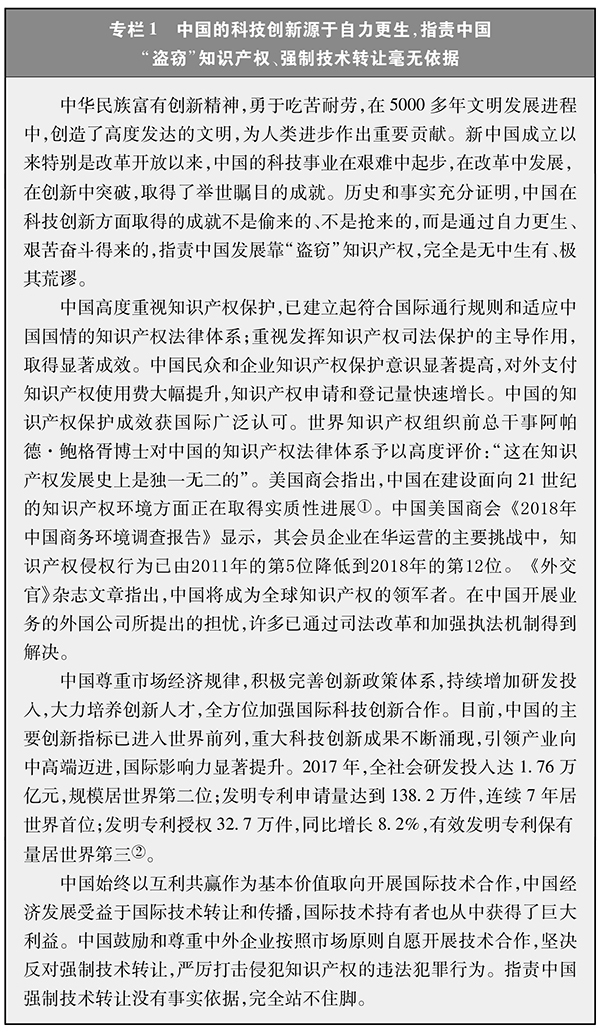一、美国挑起对华经贸摩擦损害两国和全球利益
I. Economic and trade friction provoked by the US damages the interests of both countries and of the wider world文章源自英文巴士-https://www.en84.com/7114.html
文章源自英文巴士-https://www.en84.com/7114.html
现任美国政府奉行“美国优先”政策,对外采取一系列单边主义和保护主义措施,动辄使用关税“大棒”,将自身利益诉求强加于他国。美国启用尘封多年的“201调查”“232调查”等手段,对各主要贸易伙伴频频出手,搅乱全球经贸格局。美国还将矛头对准中国,于2017年8月启动单边色彩浓厚的“301调查”,无视中国多年来在加强知识产权保护、改善外资营商环境等方面的不懈努力和取得的巨大成绩,对中国作出诸多不客观的负面评价,采取加征关税、限制投资等经贸限制措施,挑起中美经贸摩擦。文章源自英文巴士-https://www.en84.com/7114.html
文章源自英文巴士-https://www.en84.com/7114.html
Trumpeting “America First”, the current US administration has adopted a series of unilateral and protectionist measures, regularly wielded tariffs as a “big stick” and coerced other countries into accepting its demands. The US has initiated frequent investigations under the long-unused Sections 201 and 232 against its main trading partners, causing disruption to the global economic and trade landscape. Specifically targeting China, in August 2017 it launched a unilateral investigation under Section 301. Turning a blind eye to China’s unremitting efforts and remarkable progress in protecting intellectual property and improving the business environment for foreign investors, the US issued a myriad of slanted and negative observations, and imposed additional tariffs and investment restrictions on China, provoking economic and trade friction between the two countries.文章源自英文巴士-https://www.en84.com/7114.html
 文章源自英文巴士-https://www.en84.com/7114.html
文章源自英文巴士-https://www.en84.com/7114.html
Box 1: China’s technological innovation is based on self-reliance. Accusing China of intellectual property theft and forced technology transfer is utterly unfounded.文章源自英文巴士-https://www.en84.com/7114.html
文章源自英文巴士-https://www.en84.com/7114.html
China is an innovative and diligent nation. It has created a highly-sophisticated civilization and contributed significantly to human progress over the course of 5,000 years. Since the founding of the People’s Republic in 1949, and in particular since the beginning of reform and opening up in 1978, China’s scientific and technological undertakings have passed through a series of phases. They started from a difficult beginning, forged ahead in the course of reform, and have now achieved multiple breakthroughs featuring a variety of innovations. These achievements have won worldwide recognition. Historical records confirm that China’s achievements in scientific and technological innovation are not something we stole or forcibly took from others; they were earned through self-reliance and hard work. Accusing China of stealing intellectual property to support its own development is an unfounded fabrication.文章源自英文巴士-https://www.en84.com/7114.html
文章源自英文巴士-https://www.en84.com/7114.html
China is fully committed to intellectual property protection. It has established a legal system for the protection of intellectual property that is consistent with prevailing international rules and adapted to China’s domestic conditions. China values the leading role of judicial measures in protecting intellectual property, and has achieved impressive results. The understanding of the importance of intellectual property among the general public and business community in China has increased, the value of royalties paid to foreign rights-holders has risen significantly, and the number of intellectual property applications and registrations has surged.
The effective impact of China’s intellectual property protection has won broad international recognition. Former WIPO Director General Arpad Bogsch spoke highly of China’s legal framework for intellectual property protection, noting that China’s achievements are “unmatched in the history of intellectual property protection”. The US Chamber of Commerce recognized that China is making concrete progress in creating an intellectual property environment appropriate to the 21st century. In its 2018 China Business Climate Survey Report, the American Chamber of Commerce in China noted that among the main challenges facing its member companies operating in China, concern over intellectual property dropped from 5th place in 2011 to 12th place in 2018. An article in The Diplomat predicted that China will become a leader in global intellectual property. Many of the concerns raised by foreign firms doing business in China have already been addressed through judicial reform and a strengthened enforcement mechanism.
Respecting the laws of the market economy, China has been actively improving the policy system for innovation, continuously increasing investment in research and development, accelerating the development of innovators, and strengthening international cooperation on technological innovation in an all-round way. In terms of some key innovation indices, China is already among the world’s leading players. As China continues to witness a series of major scientific and technological achievements, its industries are gravitating toward the middle and high end, and the country’s international influence is markedly increasing. In 2017, total R&D investment in China reached RMB1.76 trillion, ranking second in the world. The number of patent applications reached 1.382 million, ranking No. 1 in the world for the seventh consecutive year. The number of invention patents granted reached 327,000, up by 8.2 percent year-on-year. China ranks third in the world in terms of valid invention patents held.
China has always pursued international technical cooperation with mutual benefit and win-win as the basic value orientation. China’s economic development has benefited from international technology transfer and dissemination. International holders of technology have also reaped enormous benefits from this process. China encourages and respects voluntary technical cooperation between Chinese and foreign firms based on market principles. It strongly opposes forced technology transfer and takes resolute action against intellectual property infringement. Accusations against China of forced technology transfer are baseless and untenable.
美国无视中美经济结构、发展阶段特点和国际产业分工现实,坚持认为中国采取不公平、不对等的贸易政策,导致美国出现对华贸易逆差,在双边经贸交往中“吃了亏”,并对华采取单边加征关税措施。事实上,在经济全球化时代,中美两国经济高度融合,共同构成完整的产业链,两国经济连骨带筋、互利共赢,把贸易逆差当作“吃亏”是算错了账。美国对中国采取的贸易限制措施不利于中国,也不利于美国,更不利于全球。
Turning a blind eye to the nature of the economic structure and the stage of development in China and the US, as well as the reality of the international industrial division of labor, the US insists that China’s “unfair” and “non-reciprocal” trade policies have created a trade deficit in bilateral commercial exchanges that constitutes “being taken advantage of”, leading to unilateral imposition of additional tariffs on China. In fact, in today’s globalized world, the Chinese and American economies are highly integrated and together constitute an entire industrial chain. The two economies are bound in a union that is mutually beneficial and win-win in nature. Equating a trade deficit to being taken advantage of is an error. The restrictive measures the US has imposed on China are not good for China or the US, and still worse for the rest of the world.

